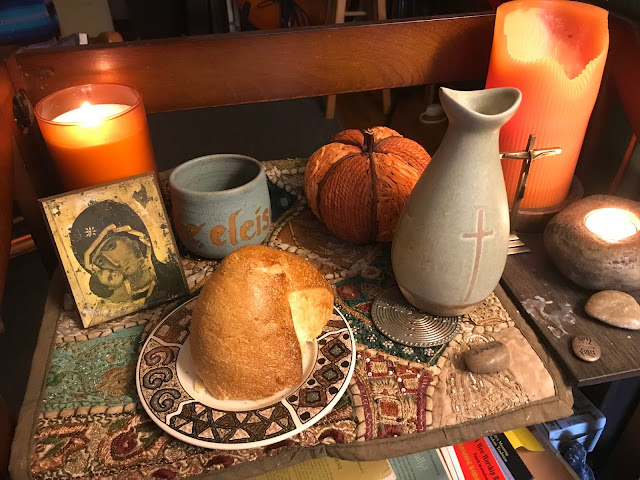- Our search for spiritual intimacy and assurance – our yearning – IS the heart of the religious experience… the desire to believe and the longing for meaning, the moving towards the ineffable – THIS is what is essential, important, and authentic despite the outward absurdity of it – or even because of the absurdity of it. When it comes right down to it, maybe faith is just a decision and God is the search. (Faith, Hope and Carnage)
- For me, vulnerability is essential to spiritual and creative growth whereas being invulnerable means being shut down and rigid. (On Being interview with Krista Tippett.)
This week there's a few gospel possibilities: many will go with St. John's insights re: John the Baptist in John 1: 6-8/19-28. My heart, however, calls me to St. Luke's words and Mary's Magnificat in Luke 1: 39-56. And here's the Nick Cave quote that will serve as our guide:
We've talked about this a lot: the idea that suffering is, by its nature, the primary mechanism of change, and that it somehow presents us with the opportunity to transform into something else - something different - hopefully something better. That God bestows upon us these terrible, devasting opportunities that bring amelioration and transformation. This change is not something we necessarily seek out; rather, change is often brought be bear upon us through a shattering or annihilation of our former selves. (Faith, Hope, and Carnage)
In starting Advent III with these texts, let me offer two preliminary qualifications:
+ First, I do not believe the Sacred causes or demands our wounds. Not only would that be cruel, but it bears no resemblance to Jesus who, in our tradition, incarnates and reveals the deepest nature of the holy we can grasp this side of the grave. Rather, as the Magnificat and countless other poems and songs make clear, as those created in the image of the Creator, we have been imbued with the ability to creatively respond to life's challenges rather than passively endure them. For most of us, we can learn the wisdom of our wounds so that our mistakes become yet one more source of mystical insight. Instead of repeating them ad nauseum, like the Magi, we can "return home by another way." Or as my AA buddies put it: If you always do what you've always done, you'll always get what you've always got.
+ Second, discovering the wisdom of our challenges and suffering is an honored spiritual practice in the East. Divination in the Eastern Orthodox tradition stands in opposition to the doctrine of original sin that dominates Western Christianity. As celebrated by St. Irenaeus and others, this practice recognizes that human being are born incomplete; that is, we are physically, emotionally, and spiritually infants who must learn to grow and mature. One way this happens is by owning our failures instead of denying or ignoring them. The more we patiently discern what the sacred is asking of us in our suffering - and change direction or alter our thinking (the true meaning of repent) - the more we will start to resemble Jesus. I believe this is part of what Jesus teaches in chapter five of St. Matthew's version of the Sermon on the Mountain: "In a word, what I’m saying is: Grow up. You’re kingdom subjects. Now live like it. Live out your God-created identity. Live generously and graciously toward others, the way God lives toward you.”
Cave suggests that because we are unschooled - and too often unwilling - to listen to the wisdom of our wounds we "blew" the charisms of the pandemic. "I think the pandemic" he said, "offered us an opportunity to improve the world and we blew it. We squandered it."
Early on, many of us felt that a chance was presented to us, as a civilization, to put aside our vanities, grievances, and divisions, our hubris, our callous disregard for each other and come together around a common enemy. Our shared predicament was a gift that could potentially have transformed the world into something extraordinary. To our shame this didn't happen. The Right got scarier, the Left got crazier, and our already fractured civilization atomized into something that resembled a collected lunacy. For many, this has been followed by a weariness, an ebbing of our strength and resolve and a dwindling belief in the common good. (Faith, Hope, and Carnage)
We will also draw sustenance from Maya Angelou's poem: Why the Caged Bird Sings.
A free bird leaps
on the back of the wind
and floats downstream
till the current ends
and dips his wing
in the orange sun rays
and dares to claim the sky.
down his narrow cage
can seldom see through
his bars of rage
his wings are clipped and
his feet are tied
so he opens his throat to sing.
The caged bird sings
with a fearful trill
of things unknown
but longed for still
and his tune is heard
on the distant hill
for the caged bird
sings of freedom.
The free bird thinks of another breeze
and the trade winds soft through the sighing trees
and the fat worms waiting on a dawn bright lawn
and he names the sky his own.
But a caged bird stands on the grave of dreams
his shadow shouts on a nightmare scream
his wings are clipped and his feet are tied
so he opens his throat to sing.
The caged bird sings
with a fearful trill
of things unknown
but longed for still
and his tune is heard
on the distant hill
for the caged bird
sings of freedom.
I hope you will join us this Sunday, December 17th @ 4 pm for Small is Holy on Advent III. We close with a simple, inclusive Eucharist for those who celebrate. @ https://www.facebook.com/profile.php?id=100039658634068





No comments:
Post a Comment